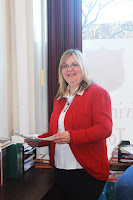 When I gave my life to Christ in August of 1969, nobody mentored me in the faith. As a result, I drifted aimlessly through my first few years as a believer until a friend invited me to a cultic house church. Though they held many blasphemous doctrines, they also taught me some valuable truths.
When I gave my life to Christ in August of 1969, nobody mentored me in the faith. As a result, I drifted aimlessly through my first few years as a believer until a friend invited me to a cultic house church. Though they held many blasphemous doctrines, they also taught me some valuable truths.From my upcoming How I Was Razed memoir, here is an excerpt that relates how I began communing with the heavenly Father daily.
-----------------------------------------------------------------
Though I petitioned and thanked God once in a while, as in the case of Mom finding me my new room, nobody taught me about the importance of having communion with him through prayer every day. That changed soon after I moved to Mr. Forcier's house. "Are you praying every day?" Terry asked me after church one Sunday as we ate lunch in Sister E's kitchen.
"No. Why should I? I don't need anything now."
"You really should do that, you know. Prayer is important because it's part of your relationship with Jesus Christ."
"Oh? I didn't know that."
"Well, it's true. You shouldn't pray just when you need something. The apostle Paul used to pray daily. He even said in his letter to the Ephesians that he prayed for his friends each day."
I considered this new concept as I ate and later as Sister E drove me home. "What if Felix or the Forciers overhear me praying?" I worried. "Jesus did say to go into your closet and pray so nobody else will hear? Will I lose my blessing or get in trouble with God if somebody overhears me?" As I pondered, I recalled that a science teacher once told me about white noise and the way its broad frequency spectrum drowned out speech. The sole source of that type of sound I had on hand was my radio.
Once I was alone in my room, I selected the F.M. band and tuned the dial between stations. Then I spoke in a low voice to Jesus. My first daily prayer only lasted a few minutes. Since nobody knocked at my door and demanded to know to whom I was speaking, as Mrs. R often did, I omitted the white noise from then on.
-----------------------------------------------------------------
How I Was Razed is the testimony of the way I was mislead by a cult church, how I turned my back on God after I felt he perennially failed to heal my eyes, and how he graciously brought me to my senses.
My previous books are now available for purchase online by clicking here. You may click here to e-mail me directly as well.








